初中语法时态全复习
初中英语语法时态总结
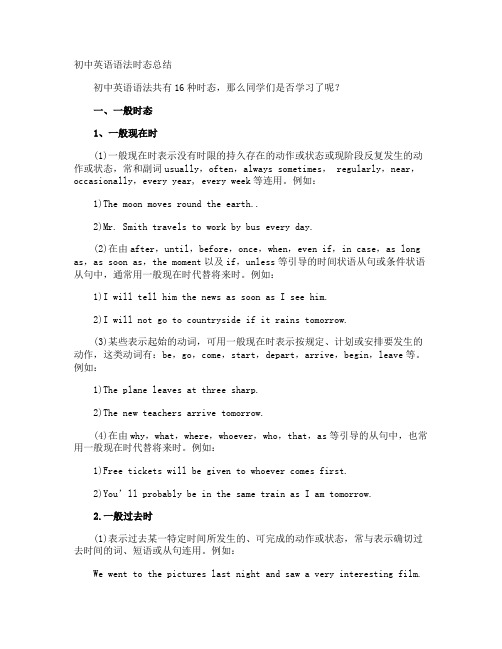
初中英语语法时态总结初中英语语法共有16种时态,那么同学们是否学习了呢?一、一般时态1、一般现在时(1)一般现在时表示没有时限的持久存在的动作或状态或现阶段反复发生的动作或状态,常和副词usually,often,always sometimes, regularly,near,occasionally,every year, every week等连用。
例如:1)The moon moves round the earth..2)Mr. Smith travels to work by bus every day.(2)在由after,until,before,once,when,even if,in case,as long as,as soon as,the moment以及if,unless等引导的时间状语从句或条件状语从句中,通常用一般现在时代替将来时。
例如:1)I will tell him the news as soon as I see him.2)I will not go to countryside if it rains tomorrow.(3)某些表示起始的动词,可用一般现在时表示按规定、计划或安排要发生的动作,这类动词有:be,go,come,start,depart,arrive,begin,leave等。
例如:1)The plane leaves at three sharp.2)The new teachers arrive tomorrow.(4)在由why,what,where,whoever,who,that,as等引导的从句中,也常用一般现在时代替将来时。
例如:1)Free tickets will be given to whoever comes first.2)You’ll probably be in the same train as I am tomorrow.2.一般过去时(1)表示过去某一特定时间所发生的、可完成的动作或状态,常与表示确切过去时间的词、短语或从句连用。
初中英语语法八大时态总结(完整版)
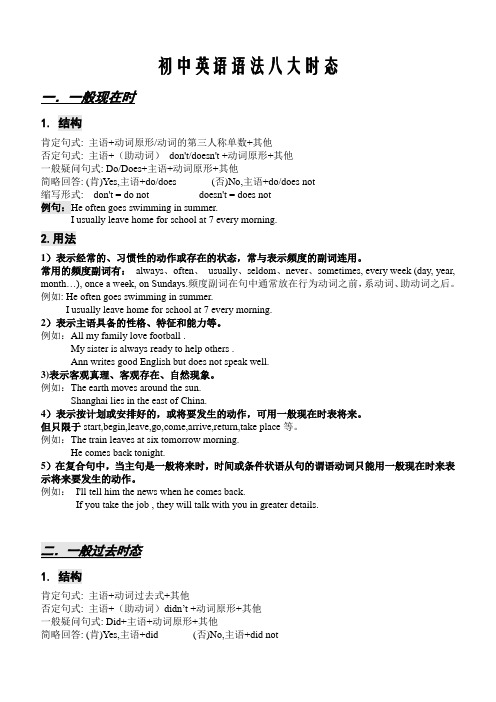
— I'm going to go fishing.
— Where is the telephone book?
— I'll go and get it for you.
两者都用于预测时,be going to意指有迹象表明某件事将要发生,属客观的推测;will则意指说话人认为/相信某件事将要发生,属主观的推测。
2)、表示说话人对于将来的看法、假设和推测,通常用于be afraid, be/feel sure, hope, know, think等后面的从句或与副词perhaps,possibly,maybe等连用。
例如:I think she’ll go back home for supper.
Maybe she’ll go to the gym.
认知类
Believe,think,understand,forget,remember
存在类
Appear,exist,lie,remain
占有、从属类
Have,own,contain,belong,possess,consist of
短暂动作类
Accept,receive,admit,decide,promise,give,finish
2)“beto+动词原形”表示客观安排或受人指示而将要做某事。
例如:We are to discuss the report next Saturday.
3)be about to +动词原形,意为马上做某事。不能与tomorrow, next week等表示明确将来时的时间状语连用,多于when引导的时间状语连用。
初中英语语法时态总结

初中英语语法时态总结-CAL-FENGHAI.-(YICAI)-Company One1初中英语语法动词时态总结一、一般现在时1)经常性或习惯性的动作,常与表示频度的时间状语连用。
时间状语:every…, sometimes, at…, on Sunday。
例如:I leave home for school at 7 every morning. 每天早上我七点离开家。
2)客观真理,客观存在,科学事实。
例如:The earth moves around the sun. 地球绕太阳转动。
Shanghai lies in the east of China. 上海位于中国东部。
3)表示格言或警句。
例如:Pride goes before a fall. 骄者必败。
注意:此用法如果出现在宾语从句中,即使主句是过去时,从句谓语也要用一般现在时。
例:Columbus proved that the earth is round. 哥伦布证实了地球是圆的。
4)现在时刻的状态、能力、性格、个性。
例如:I don't want so much. 我不要那么多。
Ann writes good English but does not speak well.安英语写得不错,讲的可不行。
比较:Now I put the sugar in the cup. 把糖放入杯子。
I am doing my homework now. 我正在做功课。
第一句用一般现在时,用于操作演示或指导说明的示范性动作,表示言行的瞬间动作。
第二句中的now是进行时的标志,表示正在进行的动作的客观状况,所以后句用一般现在时。
二、一般过去时1)在确定的过去时间里所发生的动作或存在的状态。
例如:时间状语有:yesterday, last week, an hour ago, the other day, in 1982等。
例如:Where did you go just now? 刚才你上哪儿去了?2)表示在过去一段时间内,经常性或习惯性的动作。
初中所有英语时态
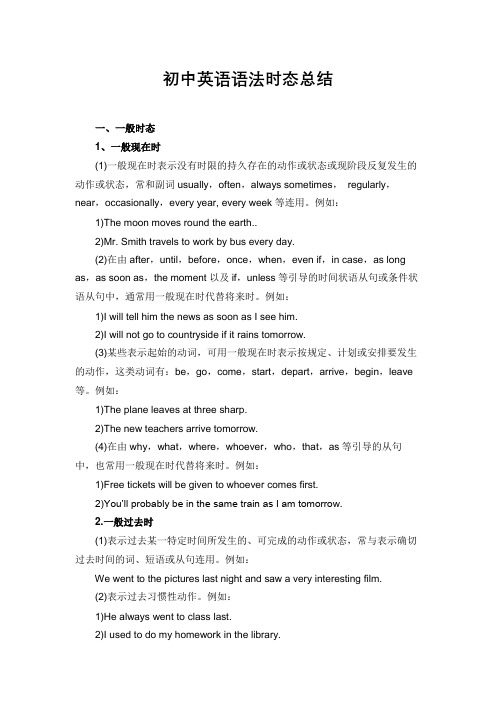
初中英语语法时态总结一、一般时态1、一般现在时(1)一般现在时表示没有时限的持久存在的动作或状态或现阶段反复发生的动作或状态,常和副词usually,often,always sometimes,regularly,near,occasionally,every year, every week等连用。
例如:1)The moon moves round the earth..2)Mr. Smith travels to work by bus every day.(2)在由after,until,before,once,when,even if,in case,as long as,as soon as,the moment以及if,unless等引导的时间状语从句或条件状语从句中,通常用一般现在时代替将来时。
例如:1)I will tell him the news as soon as I see him.2)I will not go to countryside if it rains tomorrow.(3)某些表示起始的动词,可用一般现在时表示按规定、计划或安排要发生的动作,这类动词有:be,go,come,start,depart,arrive,begin,leave 等。
例如:1)The plane leaves at three sharp.2)The new teachers arrive tomorrow.(4)在由why,what,where,whoever,who,that,as等引导的从句中,也常用一般现在时代替将来时。
例如:1)Free tickets will be given to whoever comes first.2)You’ll probably be in the same train as I am tomorrow.2.一般过去时(1)表示过去某一特定时间所发生的、可完成的动作或状态,常与表示确切过去时间的词、短语或从句连用。
初一英语语法_时态专题复习

初一英语语法,时态专题复习一、一般现在时:(1、现在的状态。
2、经常或习惯性动作。
3、主语所具备的性格和水平。
4、真理。
1、标志:often(经常),usually(通常),sometimes(有时),always(总是),never(从不),on Sundays(在星期天)every day/month/year(每一天/月/年)2、结构:(1)主语+连系动词be(am/is/are)+名词/形容词/数词/介词短语/副词等做表语表状态(包括There be +n.)练习:1.I______(be) a student. My name_____(be) Tom.2. Where _____(be) my shoes? They___(be) here.3.Who ____(be) the girl with long straight hair? I think she ___(be) Kate.4. You and I ___(not be) in Class Six.5.___(be) there a supermarket on the Fifth Avenue? Yes, there_____(be).6. ____ her parent tall? No, he____.(2)主语(非第三人称单数)+行为动词原形+其他(用助动词do 协助构成否定句、一般疑问句和特殊疑问)(3)主语(第三人称单数)+行为动词的第三人称单数+其他(用助动词does 协助构成否定句、一般疑问句和特殊疑问句)行为动词第三人称单数加-s的形式1.- s 2. 辅音+y:study-studies 3.以s,x,ch,sh结尾watch-watches teach-teaches4特殊have-has do-does go-goes.1)His parents _______(watch) TV every night. 肯定句1) My brother _________(do) homework every day.2)His parents _________(not watch) every night.否定句2)My brother________(not do)homework every day.3)_____his parents_____(watch) TV every night?一般疑3)______ your brother _____ homework every day?Yes, they _______. No, they _______. Yes, he______. No, he _________.4)When___ his parents _____(watch) TV? 特疑4)When _____ your brother ____(do) homework?They watch TV every night. He does homework every day.二.现在实行时:表示说话瞬间或现阶段正在实行的动作。
初中英语语法专项复习英语动词时态和语态讲解和练习题
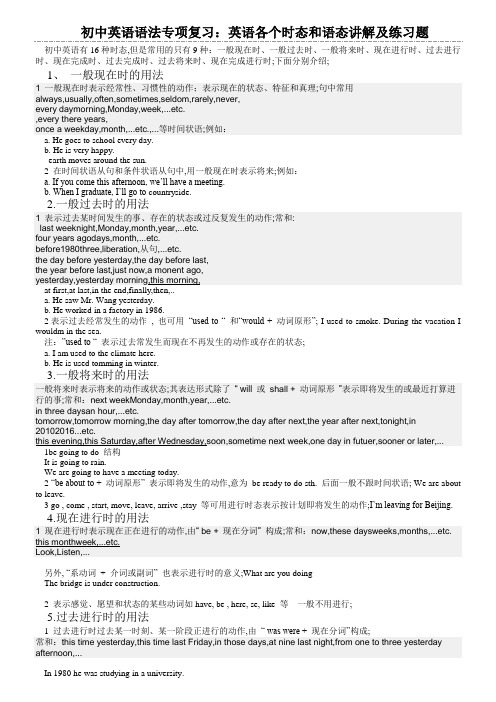
初中英语语法专项复习:英语各个时态和语态讲解及练习题初中英语有16种时态,但是常用的只有9种:一般现在时、一般过去时、一般将来时、现在进行时、过去进行时、现在完成时、过去完成时、过去将来时、现在完成进行时;下面分别介绍;1、一般现在时的用法1 一般现在时表示经常性、习惯性的动作;表示现在的状态、特征和真理;句中常用always,usually,often,sometimes,seldom,rarely,never,every daymorning,Monday,week,...etc.,every there years,once a weekday,month,...etc.,...等时间状语;例如:a. He goes to school every day.b. He is very happy.earth moves around the sun.2 在时间状语从句和条件状语从句中,用一般现在时表示将来;例如:a. If you come this afternoon, we’ll have a meeting.b. When I graduate, I’ll go to countryside.2.一般过去时的用法1 表示过去某时间发生的事、存在的状态或过反复发生的动作;常和:last weeknight,Monday,month,year,...etc.four years agodays,month,...etc.before1980three,liberation,从句,...etc.the day before yesterday,the day before last,the year before last,just now,a monent ago,yesterday,yesterday morning,this morning,at first,at last,in the end,finally,then,..a. He saw Mr. Wang yesterday.b. He worked in a factory in 1986.2表示过去经常发生的动作, 也可用“used to “ 和“would + 动词原形”; I used to smoke. During the vacation I wouldm in the sea.注:”used to “ 表示过去常发生而现在不再发生的动作或存在的状态;a. I am used to the climate here.b. He is used tomming in winter.3.一般将来时的用法一般将来时表示将来的动作或状态;其表达形式除了“ will 或shall + 动词原形”表示即将发生的或最近打算进行的事;常和:next weekMonday,month,year,...etc.in three daysan hour,...etc.tomorrow,tomorrow morning,the day after tomorrow,the day after next,the year after next,tonight,in 20102016...etc.this evening,this Saturday,after Wednesday,soon,sometime next week,one day in futuer,sooner or later,...1be going to do 结构It is going to rain.We are going to have a meeting today.2 “be about to + 动词原形” 表示即将发生的动作,意为be ready to do sth. 后面一般不跟时间状语; We are about to leave.3 go , come , start, move, leave, arrive ,stay 等可用进行时态表示按计划即将发生的动作;I’m leaving for Beijing.4.现在进行时的用法1 现在进行时表示现在正在进行的动作,由“ be + 现在分词” 构成;常和:now,these daysweeks,months,...etc. this monthweek,...etc.Look,Listen,...另外, “系动词+ 介词或副词” 也表示进行时的意义;What are you doingThe bridge is under construction.2 表示感觉、愿望和状态的某些动词如have, be , here, se, like 等一般不用进行;5.过去进行时的用法1 过去进行时过去某一时刻、某一阶段正进行的动作,由“ was were + 现在分词”构成;常和:this time yesterday,this time last Friday,in those days,at nine last night,from one to three yesterday afternoon,...In 1980 he was studying in a university.He was reading a novel when I came in.6.现在完成时的用法现在完成时由“have/has + 过去分词.其使用有两种情况:1 现在完成时所表示的动作在说话之前已完成,但对现在有影响;句中没有具体时间状语;常和:just,alreadly,yet,never,ever,now,before,this week,today,these days,once,twice,three times,...He has gone to Fuzhou.He has been to Fuzhou.2 现在完成时所表示的动作开始于过去,持续到现在,也许还会持续下去常用for 和since表示一段时间的状语或since then1949,last Monday,two o'clock,从句...,etc.,ever since then,for three daysa long time,two hours,...etc.so far , now, today, this wek month, year 等表示包括现在内的状语;He has studied English for 5 years.He has studied English since 1985.Now I have finished the work..注意:表示短暂时间动作的词如come, go , die, marry, buy 等的完成时不能与for, since 等表示一般时间的词连用;正确:I have bought the book already.错误:I have bought the book for two years.改:I have had the bookl for two years.7.过去完成时的用法1 过去完成时由“had + 过去分词”构成;过去完成时的动作表示过去某一时刻或某一时刻或某一动作之前完成的动作或状态;句中常用by then1977,yesterday,eight last night,the time we got there,...etc.by the end of last termweek,year,month,...etc..by, before, until, when 等词引导的时间状语;By the end of last year we had built five new houses.I had learnt 5000 words before I entered the university.2过去完成时的动词还可表示过去某一时刻之前发生的动作或状态持续到过去某个时间或持续下去;Before he slept, he had worked for 12 hours.8.过去将来时的用法过去将来时表示从过去的某个时间看来将要发生的动作或存在的状态;过去将来时由“should 或would + 动词原形” 构成;第一人称用should, 其他人称用would. ;常和:They were sure that they would succeed.二动词语态1.当句子的主语是动作的执行者时, 谓语的形式叫主动语态;句子的主语是动作承受者时,谓语的形式叫被动作语态;被动语态由助动词be + 过去分词构成,时态通过be 表现出来;1 一般现在时:You are required to do this.2 一般过去时:The story was told by her.3 一般将来时:The problem will be discussed tomorrow.4 现在进行时:The road is being widened.5 过去进行时:The new tool was being made.6 现在完成时:The novel has been read.7 过去完成时:He said that the work had been finished.8 过去将来时:He said that the trees would be planted soon.2. 一些特殊的被动结构1 带情态动词的被动结构:The problem must be solved soon.2 带不定式的被动结构:The room is going to be painted.The homework needs to be done with care.3 短语动词的被动:a.不及物动词+介词:若这类短语动词是及物性的,则可用于被动语态中,如:laugh at, look after, talk about, think of 等;若这类短语动词是不及物性的则不可用于被动语态中,如:book up, look down. 等b.及物动词+副词:bring about, carry out, find out, make out, put away, put off, take up, turn down, turn out, wipe out 等c. 动词+副词+介词:do away with, face up to, give into ,look down upon, make up with等d. 动词+名词+介词:catch sight of, keep on eye on, make a fool of , pay attention to , put an end to , set fire/light to , take notice of 等4 带复合宾语的动词在改为被动语态时,一般把主动结构中的宾语改为主语,宾语补足语保留在谓语后面;We always keep the classroom clean.比较:The classroom is always kept clean.5主动形式表示被动意义的词;常见的有:a.主动形式,这时动名词同句中的主语有动宾关系;The children need looking after.The windows wants /requires repairing.This point deserves mentioning.练习题1. It is a fine day. The sun __________shine brightly.2. They ___________visit the Science Museum next Sunday.3. Mr Brown________live in Beijing since he came to China.4. Mr Wang ________teach us English two years ago.5. The Smiths _______________ watch TV at this time last night.6. We __________learn about ten English songs by the end of last term.7. Father said that he ____________buy a new bike for me the next Friday.8. Bill isn¡¯t here. He ___________chat with his friends in the classroom.9. The teacher said that the moon __________go round the earth.10. The Young Pioneers will go to the zoo if it ____________not rain this Sunday.11. Listen They __________talk about the new film.12. Jim asked us what ___________happen in China in 1976.13. My mobile phone ___________steal on a bus last week.14. The host ____________interview the little boy just now.15. The Greens __________watch TV now.16. He said that he _____________ring me up when he got there.17. We ____________learn English for about three years.18. My brother_____________join the League in 1997.19. The farmers __________pick apples when I saw them.20. The red skirt __________cost the girl forty yuan.21. The film ____________begin when I got to the cinema.22. The girl told me that she wanted to be an English teacher when she _____grow up.23. My sister is a student and she _____________study at a middle school nearby.24. Mr Green __________travel to several places in South China since he came here.25. You _________catch the early bus if you get up early.26. _______you been________wear glasses all the time27. I’ll go home as soon as I _______finish my homework.29. Most science books are ______write in English.30. I ____________stay there for two months last year.31. Tell Lily to call me as soon as she _______.A. will arriveB. gets thereC. has goneD. reach here32. ----Hi, Kate. You look tired. What’s the matter ----I ______ well last night.A. didn’t sleepB. don’t sleepC. haven’t sleptD. won’t sleep33. ----Excuse me, look at the sign over there, please. Could you stop smoking----Sorry, I ____ that.A. didn’t seeB. don’t seeC. won’t seeD. can’t see34. ----Well, I found this. I think it must be yours. ----My watch Thank you. Where _____itA. do you findB. had you foundC. were you findingD. did you find35. ----Don you know when Dr White ____ for dinner this evening----No, but I think he ____ when he is free.A. will come; comesB. will come; will comeC. comes; comesD. comes; will come36. Look at those black clouds. It _____ rain. Let’s hurry. A. maybe B. would C. has D. is going to37. ----Jimmy is leaving for a holiday. ----Really Where ____ he ____A. has; goneB. will; goC. did; goD. does; go38. ----Shall we go shopping now ---Sorry, I can't. I ____ my shirts.A. washB. washesC. washedD. am washing39. ----I called you yesterday evening, but there was no answer.----Oh, I am sorry. I ___ dinner at my friend's home.A. haveB. hadC. was havingD. have had40. The Oriental Pearl TV Tower ____ thousands of visitors since 1995.A. attractedB. attractsC. has attractedD. will attract46. ----Why didn't you go to the cinema yesterday -----Because I ____ the film before.A. had seenB. have seenC. have watchedD. has watched47. I don't think John saw me. He ____ a book at that moment.A. just readB. has just readC. was just readingD. had just read48. Mr Smith ____ a book about China last year but I don't know whether he has finished it.A. has writtenB. wroteC. had writtenD. was writing49. Mr White ____ the newspaper while his daughter ____TV.A. has read; was watchingB. was reading; watchedC. was reading; was watchingD. reading; watched50. ---- I ____ you at the meeting. Why ----I was ill. A. saw B. have seen C. not see D. didn't see51. The 29th Olympic Games ____ in Beijing in 2008. A. hold B. will hold C. will be held D. held52. Hurry up The play ____ for ten minutes. A. has been on B. has begun C. had begun D. began53. ----May I speak to Mr Smith ----Sorry, he ____ Australia. But he ____ in two days.A. has been to; will come backB. has gone to; will be backC. has been in; would come backD. is leaving for; doesn't come back54. I can't go to the theater tonight because I ____ my ticket.A. have lostB. had lostC. will loseD. was losing55. ----What a nice bike How long ____ you ____ it ----Just two weeks.A. have; boughtB. did; buyC. have; hadD. are; having56. ----I'm sorry to have kept you waiting. ----Oh, not at all. I ____ here only for a few minutes.A. have comeB. had beenC. wasD. have been57. ----____ my dictionary anywhere ---- Yes. I saw it on your desk a moment ago.A. Did you seeB. If you seeC. Had you seenD. Would you see58. We were all surprised when he mad it clear that he ____ office soon.A. leavesB. would leaveC. will leaveD. had left答案:I. 1. shines/ is shining 2. are going to/ will visit 3. has lived 4. taught5. were watching6. had learned7. would buy8. is chatting9. goes 10.doesn't rain 11. are talking 12. happened 13. was stolen 14. interviewed15. are watching16. would ring 17. have learned 18. joined 19. were picking 20. cost21. had begun 22. grew 23. studies 24. has traveled 25. will catch26. Have; wearing 27. finish 28. haven't heard 29. written 30. stayedII. 31--35 BAADB 36--40 DBDCC 41--45 ACBAC 46--50 ACDCD51--55 CABAC 56--60 DABDA 61--65 BDBAB 66-70 BDABC 71--75 BCADD。
初中英语语法八大时态总结完整版
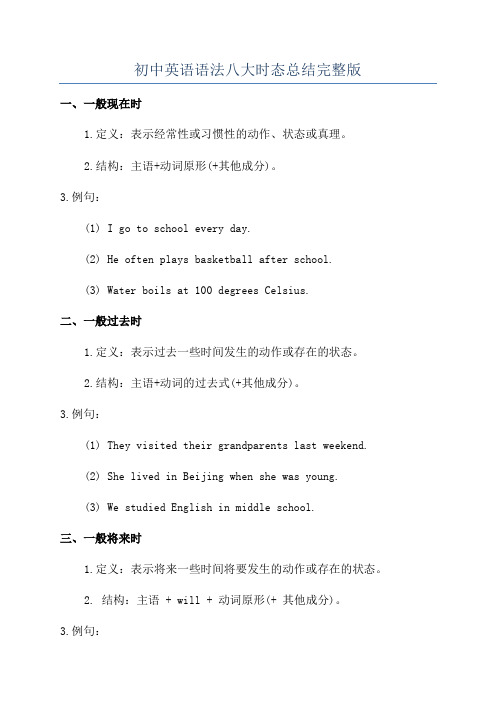
初中英语语法八大时态总结完整版一、一般现在时1.定义:表示经常性或习惯性的动作、状态或真理。
2.结构:主语+动词原形(+其他成分)。
3.例句:(1) I go to school every day.(2) He often plays basketball after school.(3) Water boils at 100 degrees Celsius.二、一般过去时1.定义:表示过去一些时间发生的动作或存在的状态。
2.结构:主语+动词的过去式(+其他成分)。
3.例句:(1) They visited their grandparents last weekend.(2) She lived in Beijing when she was young.(3) We studied English in middle school.三、一般将来时1.定义:表示将来一些时间将要发生的动作或存在的状态。
2. 结构:主语 + will + 动词原形(+ 其他成分)。
3.例句:(1) I will go to the park tomorrow.(3) We will have a party next week.四、现在进行时1.定义:表示现在正在进行的动作。
2. 结构:主语 + am/is/are + 动词-ing(+ 其他成分)。
3.例句:(1) She is reading a book right now.(2) They are playing soccer in the park.(3) We are having dinner at the moment.五、过去进行时1.定义:表示过去一些时间正在进行的动作。
2. 结构:主语 + was/were + 动词-ing(+ 其他成分)。
3.例句:(1) He was watching TV at 8 o'clock last night.(2) They were traveling in Europe during summer vacation.(3) We were studying when the phone rang.六、将来进行时1.定义:表示将来一些时间正在进行的动作。
初中英语语法时态总结归纳

初中英语语法时态总结归纳英语语法中的时态是指动词在时间上的形式和表达。
在初中英语学习中,时态是一个非常重要的语法知识点。
掌握时态的正确用法对于学习英语语法和提高英语表达能力非常关键。
本文将对初中英语中常见的时态进行总结和归纳,包括一般现在时、一般过去时、一般将来时、现在进行时、过去进行时等。
下面将逐个进行详细介绍。
一、一般现在时一般现在时表示经常性的、习惯性的动作和现在的真理、主张、感觉等。
在一般现在时中,主语是第三人称单数时,动词要加上-s或者-es。
1. 肯定句的结构:主语 + 动词原形(+ -s/-es)例如:- I play basketball.- He reads books every day.2. 否定句的结构:主语 + do not/ does not + 动词原形例如:- I do not play basketball.- He does not read books every day.3. 疑问句的结构:Do/ Does + 主语 + 动词原形?例如:- Do you play basketball?- Does he read books every day?二、一般过去时一般过去时表示在过去某个时间里发生的动作或存在的状态。
在一般过去时中,动词过去式表示过去的时间。
1. 肯定句的结构:主语 + 动词过去式例如:- I played basketball yesterday.- She watched a movie last night.2. 否定句的结构:主语 + did not + 动词原形例如:- I did not play basketball yesterday.- She did not watch a movie last night.3. 疑问句的结构:Did + 主语 + 动词原形?例如:- Did you play basketball yesterday?- Did she watch a movie last night?三、一般将来时一般将来时表示将来某个时间要发生的动作或存在的状态。
时态复习初中英语八种时态归纳复习

.初中英语八种常用时态归纳复习一、一般现在时:概念:经常、反复发生的动作或行为及现在的某种状况。
时间状语:always,usually,often,sometimes,everyweek(day,year,month…),onceaweek,onSundays,etc.基本结构:①be动词;②行为动词否定形式:①am/is/are+not;②此时态的谓语动词若为行为动词,则在其前加don't,如主语为第三人称单数,则用doesn't,同时还原行为动词。
一般疑问句:①把be动词放于句首;②用助动词do提问,如主语为第三人称单数,则用does,同时,还原行为动词。
二、一般过去时:概念:过去某个时间里发生的动作或状态;过去习惯性、经常性的动作、行为。
时间状语:ago,yesterday,the day before yesterday,last week(year,night,month…),In 1989,justnow,at the age of 5,oneday,long long ago,once up on a time,etc.基本结构:①be动词;②行为动词否定形式:①was/were+not;②在行为动词前加didn't,同时还原行为动词。
一般疑问句:①was或were放于句首;②用助动词do的过去式did提问,同时还原行为动词。
三、现在进行时:概念:表示现阶段或说话时正在进行的动作及行为。
时间状语:now,atthistime,thesedays,etc. 基本结构:am/is/are+doing否定形式:am/is/are+not+doing. 一般疑问句:把be动词放于句首。
四、过去进行时:概念:表示过去某段时间或某一时刻正在发生或进行的行为或动作。
时间状语:atthistimeyesterday,atthattime或以when引导的谓语动词是一般过去时的时间状语等。
初中英语语法八大时态总结
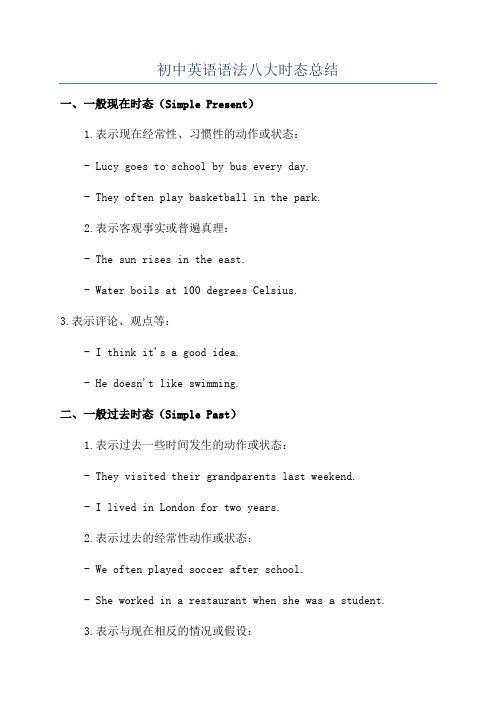
初中英语语法八大时态总结一、一般现在时态(Simple Present)1.表示现在经常性、习惯性的动作或状态:- Lucy goes to school by bus every day.- They often play basketball in the park.2.表示客观事实或普遍真理:- The sun rises in the east.- Water boils at 100 degrees Celsius.3.表示评论、观点等:- I think it's a good idea.- He doesn't like swimming.二、一般过去时态(Simple Past)1.表示过去一些时间发生的动作或状态:- They visited their grandparents last weekend.- I lived in London for two years.2.表示过去的经常性动作或状态:- We often played soccer after school.- She worked in a restaurant when she was a student.3.表示与现在相反的情况或假设:- If I had money, I would buy a new car.- I wish I could go to the concert with you.三、一般将来时态(Simple Future)1.表示将来要发生的事情:- I will meet him at the airport tomorrow.- They are going to have a party next week.2.表示意愿、打算或承诺:- I promise I will help you.- She is going to study abroad next year.四、现在进行时态(Present Continuous)1.表示现在正在进行或暂时的动作:- They are playing football in the park.- He is studying for the exam.2.表示现阶段的变化或趋势:- The population of the city is increasing rapidly.- More and more people are using smartphones.五、过去进行时态(Past Continuous)1.表示过去一些时间正在进行中的动作:- I was watching TV when she called me.- They were having dinner when the power went out.2.表示过去一些时间同时发生的两个动作:- While he was reading, his sister was playing the piano.- When I arrived, they were still waiting for you.六、将来进行时态(Future Continuous)1.表示将来一些时间正在进行的动作:- He will be sleeping when you arrive.2.表示将来一些时间同时发生的两个动作:- While you are washing the dishes, I will be cleaning the bathroom.- When I call you, she will be cooking dinner.七、现在完成时态(Present Perfect)1.表示过去发生但对现在有影响的动作或状态:- I have lost my key, so I can't open the door.- She has finished her homework, so she can watch TV now.2.表示经历或遭遇过的事情:- Have you ever been to Paris?- He has never seen such a beautiful sunset.八、过去完成时态(Past Perfect)1.表示在过去一些时间之前已经发生的动作或状态:- When I arrived, they had already left.2.表示过去一些时间之前一直存在或保持的状态:- He had lived in that house for 10 years before he moved out.- She had been planning the party for weeks.。
初中英语时态语法总结
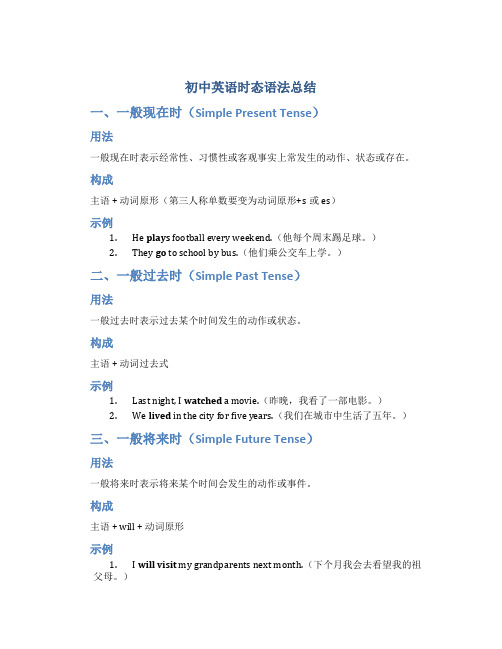
初中英语时态语法总结一、一般现在时(Simple Present Tense)用法一般现在时表示经常性、习惯性或客观事实上常发生的动作、状态或存在。
构成主语 + 动词原形(第三人称单数要变为动词原形+s或es)示例1.He plays football every weekend.(他每个周末踢足球。
)2.They go to school by bus.(他们乘公交车上学。
)二、一般过去时(Simple Past Tense)用法一般过去时表示过去某个时间发生的动作或状态。
构成主语 + 动词过去式示例st night, I watched a movie.(昨晚,我看了一部电影。
)2.We lived in the city for five years.(我们在城市中生活了五年。
)三、一般将来时(Simple Future Tense)用法一般将来时表示将来某个时间会发生的动作或事件。
构成主语 + will + 动词原形示例1.I will visit my grandparents next month.(下个月我会去看望我的祖父母。
)2.They will have a meeting tomorrow.(他们明天会开会。
)四、现在进行时(Present Continuous Tense)用法现在进行时表示现在正在进行或发生的动作。
构成主语 + am/is/are + 动词-ing形式示例1.We are studying English at the moment.(我们此刻正在学习英语。
)2.He is playing football in the park.(他正在公园里踢足球。
)五、过去进行时(Past Continuous Tense)用法过去进行时表示过去某个时间正在进行或发生的动作。
构成主语 + was/were + 动词-ing形式示例1.I was sleeping when you called me.(你给我打电话的时候,我正在睡觉。
英语语法复习——八大时态

中考英语语法复习——八大时态初中英语八大时态(讲与练)(一)谓语动词的形式:英语的时态是通过谓语动词的变化来体现的。
因此,了解谓语动词的形式及其变化规律非常重要。
英语的实义动词有以下五种形式:(1) 动词原形:动词原形在句子中形式不变。
主要用于主语为第一、二人称的一般现在时,情态动词之后,或根据语法规定必须用动词原形的其他情况。
(2) 一般现在时第三人称单数形式(简称现单三):主要用于主语为第三人称单数的一般现在时。
(3) 过去式:主要用于一般过去时。
(4) 现在分词:主要用于进行时态。
(5) 过去分词:主要用于完成时态,或被动语态。
谓语动词一般现在时第三人称单数(现单三)的构成,见下表:写和读音规则如下表:的不规则动词表。
谓语动词现在分词一律由动词原形加-ing构成,规则如下表:“时态”就是通过谓语动词的形态变化,来表达动作发生的时间(现在、过去、将来、过去将来)及所处的状态(一般、进行、完成、完成进行)。
1、一般现在时(1)构成:通常以动词原形表示。
主语为第三人称单数时,用单三形式。
(2)用法:1)表示现状、性质、状态和经常的或习惯性的动作。
He has an uncle.他有个叔叔。
Autumn follows summer.夏天之后是秋天。
这些动词可与often, usually, always, sometimes, every day, once a week, on Sundays, never 等表示经常性或习惯性的时间状语连用。
例如:Do you often go to the cinema? 你经常去看电影吗?Tom does not study as hard as Jane. 汤姆在学习方面不如简努力。
My father never takes a bus; he walks to his office.我父亲从来不坐公共汽车,他走着去上班。
2)表示客观现实或普遍真理。
The sun rises in the east. 太阳从东方升起。
初中英语语法八大时态总结(完整版)
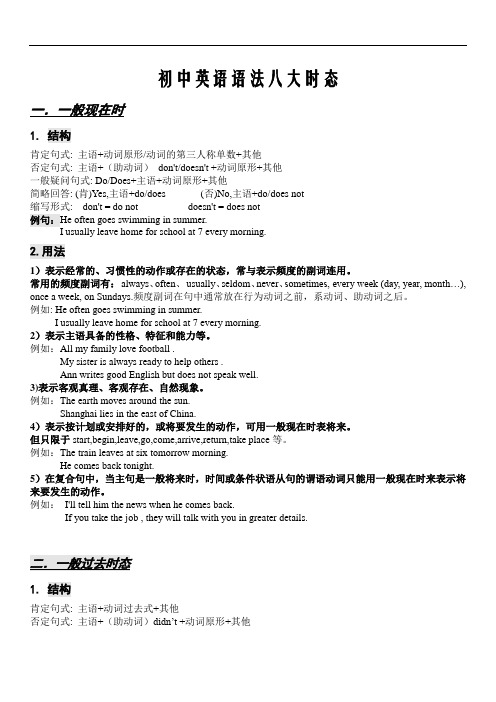
初中英语语法八大时态一.一般现在时1.结构肯定句式: 主语+动词原形/动词的第三人称单数+其他否定句式: 主语+(助动词)don't/doesn't +动词原形+其他一般疑问句式: Do/Does+主语+动词原形+其他简略回答: (肯)Yes,主语+do/does (否)No,主语+do/does not缩写形式: don't = do not doesn't = does not例句:He often goes swimming in summer.I usually leave home for school at 7 every morning.2.用法1)表示经常的、习惯性的动作或存在的状态,常与表示频度的副词连用。
常用的频度副词有:always、often、usually、seldom、never、sometimes, every week (day, year, month…), once a week, on Sundays.频度副词在句中通常放在行为动词之前,系动词、助动词之后。
例如: He often goes swimming in summer.I usually leave home for school at 7 every morning.2)表示主语具备的性格、特征和能力等。
例如:All my family love football .My sister is always ready to help others .Ann writes good English but does not speak well.3)表示客观真理、客观存在、自然现象。
例如:The earth moves around the sun.Shanghai lies in the east of China.4)表示按计划或安排好的,或将要发生的动作,可用一般现在时表将来。
初中英语语法动词八种时态详解
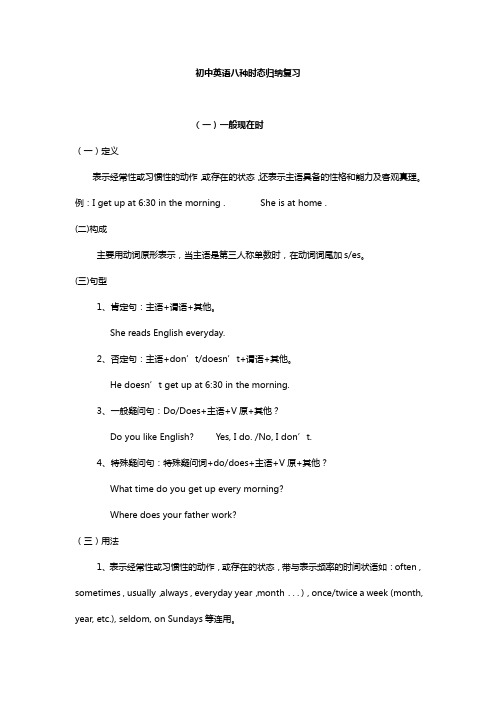
初中英语八种时态归纳复习(一)一般现在时(一)定义表示经常性或习惯性的动作,或存在的状态,还表示主语具备的性格和能力及客观真理。
例:I get up at 6:30 in the morning . She is at home .(二)构成主要用动词原形表示,当主语是第三人称单数时,在动词词尾加s/es。
(三)句型1、肯定句:主语+谓语+其他。
She reads English everyday.2、否定句:主语+don’t/doesn’t+谓语+其他。
He doesn’t get up at 6:30 in the morning.3、一般疑问句:Do/Does+主语+V原+其他?Do you like English? Yes, I do. /No, I don’t.4、特殊疑问句:特殊疑问词+do/does+主语+V原+其他?What time do you get up every morning?Where does your father work?(三)用法1、表示经常性或习惯性的动作,或存在的状态,带与表示频率的时间状语如:often , sometimes , usually,always , everyday year,month...), once/twice a week (month, year, etc.), seldom, on Sundays等连用。
I leave home for school at seven every morning.2、表示客观真理,科学事实、格言警句。
The sun rises in the east .日出东方。
The earth goes around the sun .地球绕着太阳转。
Ten minus two is eight.十减二等于八。
Light travels faster than sound .光的速度比声音的速度快。
初中英语2024届中考语法复习动词时态知识讲解

中考英语语法复习动词时态知识讲解一、时态定义* 时态是英语谓语动词的一种形式,表示动作发生的时间和所处的状态。
* 英语中的时态是通过动词形式本身的变化来实现的。
英语中主要有十六种时态,在初中英语阶段主要掌握六种时态:一般现在时、现在进行时、一般将来时、一般过去时、过去进行时以及现在完成时。
二、一般现在时(一)一般现在时用法:1.一般现在时表示习惯性的动作、讲话时人或物的特性或状态。
Eg: I go to school on foot every day.我每天走路上学She has a cute dog.她又一只可爱的狗。
2.表示自然现象或客观真理时Eg: Light travels more quickly than sound.光的传播速度比声音快。
The Earth goes around the Sun.地球绕着太阳转。
3.在if引导的条件状语从句中,从句用一般现在时Eg: If it rains tomorrow, I will stay at home.如果明天下雨我就呆在家里。
(二)一般现在时的结构1.结构:肯定式:主语 + 谓语动词 + 其它否定式:主语 + don't + 谓语动词 + 其它一般疑问句:Do + 主语 + 谓语动词 + 其它特殊疑问句:特殊疑问词 + 一般疑问句注意:当主语是第三人称单数时,谓语动词要用三单形式,助动词do要变为does。
Eg: 肯定句: I work in Beijing.我在北京工作。
She works in Beijing.她在北京工作。
否定句:I don’t work in Beijing.我不在北京工作。
She doesn’t work in Bejing.她不在北京工作。
一般疑问句:Do you work in Bejing?你在北京工作吗?Does she work in Beijing?她在北京工作吗?特殊疑问句: Where do you work?你在哪工作?Where does she work?她在哪工作?2.动词三单形式变化规则(1)一般情况下直接加-s;Eg: cook -- cooks; work -- works(2)以s, x, ch, sh, o结尾的动词加-es;Eg: catch -- catches; go -- goes; do -- does(3)以辅音加y结尾,将y变成i再加-es;Eg: study -- studies; try -- tries(4)特殊变化:have -- has(三)一般现在时时间标志词一般现在时常与every day, often, usually, always, seldom, sometimes等时间状语连用。
初中英语中考语法考点 专题十动词的时态和语态

school since1989.
• A.offered
B.has offered
• C.is offered
D.is offering
• ( )4.(2020·铜仁)—Maria,what do you think of Mount Fanjing?
• —Very cool.I________ there once.I'd like to go there again.
• 拓展:1.一般过去时和现在完成时的易混辨析
• 两者都表示过去发生的事情。但一般过去时只强调过去发生的事情本 身,不涉及与现在的关系;现在完成时则强调过去的动作对现在造成的影响, 主要说明现在的情况。如: • I opened the door just now.我刚才开了门。(指刚才做了“开门”的动作, 但现在门是否开着,并未说明)
将 来
标志词
tonight,tomorrow,from now on,soon,in the future,next year(next系列)等 注意:在时间、条件和让步状语从句中,从句用一般现在时表将来
时
The twins will go to the cinema with their parents tonight.
时
The boy usually gets to school early.
例句 这个男孩通常早早地到学校。
The moon moves around the earth.月亮绕着地球转。
用法
表示过去的动作或状态
构成 (1)主语+was/were(+其他)
一
(2)主语+动词的过去式(+其他)
般
过 去 时
专题十 动词的时态 和语态
初中英语语法八大时态总结

1.一般现在时2 .一般过去时3 .一般将来时4 .现在进行时5 .过去进行时6 .现在完成时7 .过去完成时8 .过去将来时1.一般现在时1.一般现在时的构成一般现在时主要用动词原形表示,如果主语是第三人称单数则动词也要用第三人称单数形式。
动词第三人称单数的构成方式如下:构成方法例词一般在词尾加-s work—works;spend—spends在以s,z,ch,sh,x等字母结尾的动词之后加-es pass—passes;wash—washes;teach—teaches;mix—mixes以不发音的e结尾的动词只在e后加-s write—writes;ride—rides 以“辅音字母+y”结尾的动词,变y为i,再加-esstudy—studies;try—tries 以o结尾的动词,在词尾加-es do—does;go—goes2.一般现在时的用法(1)表示经常性或习惯性的动作或存在的状态,常与often,always,usually,sometimes,once a week,every day/...等表示频率的副词或时间状语连用。
如:I often go to school by bike.我经常骑车去上学。
(2)表示客观事实或普遍真理。
如:The earth goes around the sun.地球绕着太阳转。
(3)在时间、条件等状语从句中,用一般现在时表示将来。
如:If it rains tomorrow,we won't go to the park.如果明天下雨,我们将不去公园。
When I grow up,I will go to America.当我长大后,我将去美国。
即学即练( )1.If Nancy ________ the exam ,she will go to Australia for English study.A .passB .passedC .passesD .will pass ( )2.The Greens will visit Hainan as soon as they ________ to China.A .comesB .comeC .cameD .will come ( )3.Now my father ________ his bike to work every day instead of driv ing.A .rideB .rodeC .ridesD .will rideC B C2.一般过去时1.一般过去时的构成一般过去时用动词的过去式表示,即:主语+动词的过去式。
英语人教版九年级全册语法复习之时态

8. 7. – What has happened to the fish, Mary?
9. -- Mum, the chaat s__e_a_te_n_ (eat) the fish. Just now
the jcuamt _p_e_d__(jump) onto the table anadte_____(eat)
动词时态
初中阶段8种时态: 1.一般现在时 2.一般过去时 3.一般将来时 4.现在进行时 5.过去进行时 6.现在完成时 7.过去完成时 8.过去将来时
(1) 一般现在时:
1.表示经常反复发生的动作.
2. e.g. They often spend their holidays in
the south.
5. -- ___Is_ my son __w_o_r_k_in_g___ (work) hard this term?
6. -- Oh, yes, he _is__tr_y_i_n_g__(try) his best now.
7. 6. D__o_e_s__ the hatfi_t______ (fit) me well?
it up. lived
10.8. Sam ____( live) in the small town fhoarvfievegryoewanrs
during the war.
saw
11.9. It is ages since I last ____(see) you. You
___(grow) taller.
进行)的动作: 4. e.g. We are writing a paper these days.
一般现在时与现在进行时的区别
1.进行时强调动作正在进行,而现在时强调动作的
初一英语上册【语法八大时态】知识点整理,月考复习必看
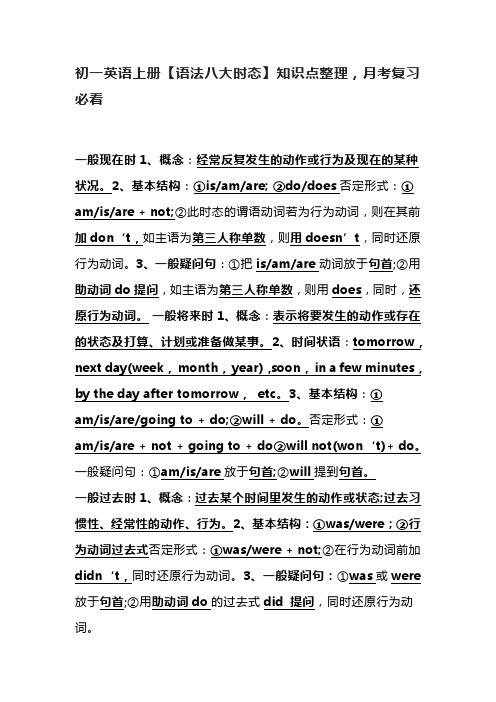
初一英语上册【语法八在时1、概念:经常反复发生的动作或行为及现在的某种状况。2、基本结构:①is/am/are; ②do/does否定形式:①am/is/are + not;②此时态的谓语动词若为行为动词,则在其前加don‘t,如主语为第三人称单数,则用doesn’t,同时还原行为动词。3、一般疑问句:①把is/am/are动词放于句首;②用助动词do提问,如主语为第三人称单数,则用does,同时,还原行为动词。一般将来时1、概念:表示将要发生的动作或存在的状态及打算、计划或准备做某事。2、时间状语:tomorrow, next day(week, month, year),soon, in a few minutes, by the day after tomorrow, etc。3、基本结构:①am/is/are/going to + do;②will + do。否定形式:①am/is/are + not + going to + do②will not(won‘t)+ do。一般疑问句:①am/is/are放于句首;②will提到句首。
过去将来时1、概念:立足于过去某一时刻,从过去看将来,常用于宾语从句中。2、时间状语:the next day(morning, year),the following month(week),etc。3、基本结构:①was/were/going to + do;②would + do。否定形式:①was/were/not + going to + do;②would + not + do。一般疑问句:①was或were放于句首;②would提到句首。
- 1、下载文档前请自行甄别文档内容的完整性,平台不提供额外的编辑、内容补充、找答案等附加服务。
- 2、"仅部分预览"的文档,不可在线预览部分如存在完整性等问题,可反馈申请退款(可完整预览的文档不适用该条件!)。
- 3、如文档侵犯您的权益,请联系客服反馈,我们会尽快为您处理(人工客服工作时间:9:00-18:30)。
一般过去时
5
1.一般过去时表示一个动作或情况 在过去某个的时间开始和结束. I walked to school yesterday. I bought a new car three days ago.
walked,bought
now
用法:过去时间发生的或过去经常性的动作
常用时间状语:yesterday,last night,two days ago, in 2000,at that time,before liberation,when 等引导的含 过去时的句子。 动词构成:动词过去时(--ed) worked/used to work 否定构成:didn’t+动原 didn’t work used not(didn’t use) to work 一般疑问构成及简答举例:Did+主语+动原+其它? 特殊疑问句举例:What did he do yesterday? When did he get up this morning? 备注:He has opened the door.(表示过去“开门”的动作对现在的 影响是门还开着)He opened the door.(不能确定门现在是否开着)
The CCTV has been broadcasting English programs ever since 1977.
一共复习了 5个了,还 有4个呀!
6 过去进行时
过去进行时: I was walking down the street when it began to rain.
When it began to rain
now
I was walking
用法:过去某一时刻或某一段时间内正在发生 的动作 常用时间状语:at this time yesterday,at that time, at ten o’clock yesterday或when引导的从句 动词构成: was/were+现在分词(--ing) 以work为例:was/were working 否定构成: was/were not+现在分词 一般疑问构成及简答举例: Was/Were+主语+现在分词+其它? Yes,I was No,I wasn’t 特殊疑问句举例: What were you dong this time yesterday? Where was he standing when the teacher came in?
用法:说话时正在进行的动作或当 前一段时间正在进行的动作 常用时间状语 :now,these days 动词构成 : am/is/are+现在分词(--ing) am/is/are working 否定构成 : am/is/are+not+现在分词 一般疑问构成及简答:Am/Is/Are+主语+现在分词 + 其它?Yes,I am(he is.) No,they aren’t 特殊疑问举例:What are you doing now? Who is flying a kite there? 注意:go,come,leave.arrive,return,die等的进 行
现在完成时用法
I can’t find my pen. I have lost 过影响现 it. Have you finished it yet ? He has worked here for a year. 过延到现 I have been in this school since 1999 . He has been to China twice. 两“去” He isn’t here. He has gone to the library.
8
过去将来时
past
now
future
4
1.
现在完成进行时
现在完成进行时 构成: have + been + v-ing 用法:现在完成进行时,表示某一动作发生在过去, 延续至现在,也可以表示这一动作仍在进行或尚在 继续. 例子:她已撰写了这本书 She has been writing the book. (尚未写完,仍在继续) We have been talking about you. 我们正在谈着你。
现在进行时用法 正在进行 Look, they are playing football. 一直进行 He is writing a novel this year. 与always My teacher is always smiling in class. 连用
2
现在完成时
现在完成时
用法: 1、发生在过去的动作且对现在仍有影响的动作, 强调对现在的影响.2、从过去一直延续到现在的动作 常用时间状语:already,just,never,before,recently,in the past few years,ever,so far,since+过去的点时 间,for+段时间 动词构成:have/has+过去分词(--ed) have/has worked 否定构成:have/has not+过去分词 一般疑问构成: Have/Has+主语+过去分词…? 特殊疑问句举例:What have you done recently? How long has he lived in Beijing? 备注:暂时性动词不能与for…, since…,How long…等 表示段时间 的短语同时使用。
过去进行时用法
过时正进
I was doing my homework at eight last night.
They were watching TV from 过段直进 nine to ten yesterday.
when, while
They were reading aloud when the teacher came in.
初中英语语法
——时态篇
教学目标:1 学习初中英语几种主要时态的定义和结构, 并能运用时态做练习题。 2 掌握时态中的难点和考点,自信面对会考。
现在时
16 种 英 语 时 态
一般现在时 现在完成时 现在进行时 现在完成进行时 一般过去时 过去进行时 过去完成时 过去将来时
一般将来时
过去时
过去完成进行时 过去将来进行 过去将来完成时 过去将来完成进行时
一般将来进行时 将来完成时 将来完成进行时
将来时
1、用时间轴表示时态 21
1.一般现在时表示总是、通常、 习惯性的动作或状态。 It snows in winter. I watch television every day.
2.用于对客观事实的普遍性的陈述。 3.某些动词的一般现在时表示 说话时正在存在的一种情况。 I have only a dollar right now. I don’t know that man. He needs a pen right now. 注:这些动词不能用于进行时。
When we got to the theatre, they had sold all the tickets.
过去的过去 had sold got to the theatre Now
用法:从过去某时间来看将要发生的动作或状态, 常用于宾从 常用时间状语:the next week等 动词构成: 1、would/should+动原 2、 was/were going to+动原 3、was/were(about) to+动原 以work为例:would/should work was/were going to work was/were(about) to work 否定构成:would/should not… was/were not… 一般疑问构成:常用if或whether引导宾从 特殊疑问句举例:He asked what they would do the next week.
一般将来时用法 将来状态 There will be rain tomorrow. 将来活动 主将从现
What are you going to do next weekend? I will call you as soon as I get there tomorrow morning.
现进表将 The bus is coming.
一般现在时
用法:经常性的和习惯性的动作 常用时间状语 : usually,sometimes,in spring,
every day,in the morning 动词构成 :动词原型. work 动词+S.(主语是第三人称单数)works 否定构成 : don’t+动原 doesn’t+动原 一般疑问构成及简答:Do+主语+动原+其它?Yes,I do. Does+主语+动原+其它?No,he doesn’t. 特殊疑问举例 :What do you often do on Sundays? Where does he live? 注意: start,leave,go,come等的一般现在时可表示按 规 定要发生的未来动作,如列车将离开。客观真理在从句中 也用一般现在时
一般过去时用法
过去活动 I saw him yesterday.
过去状态 I was in Grade One last year. 过去连续 She picked it up and went out. 活动
一般将来时
9
用法:将来会出现或发生的动作 常用时间状语:this evening,tomorrow,next month, in a few minutes,at the end of this term 动词构成: 1,will/shall+动原 2,am/is/are going to+动词原型 3,sm/is/are(about)+动词不定式 4,am/is/are+coming等现在分词 以work为例:will/shall work am/is/are going to work am/is/are(about) to work am/is/are coming/leaving… 否定构成:will/shall not… am/is/are not… 特殊疑问句举例:What will you do tomorrow? When are we going to have a class meeting? 备注:在if条件或as soon as等时间状语从句中用一般现在 时代替一般将来时。
